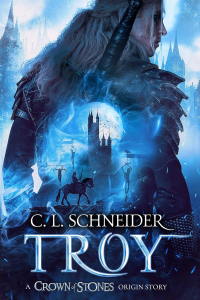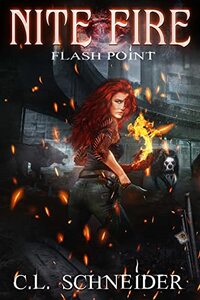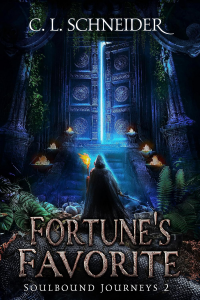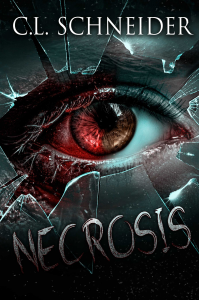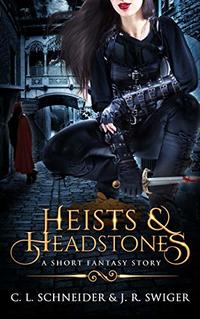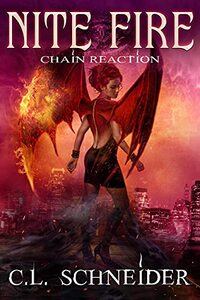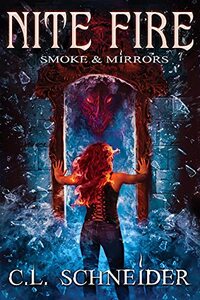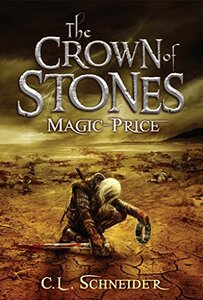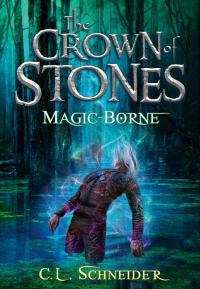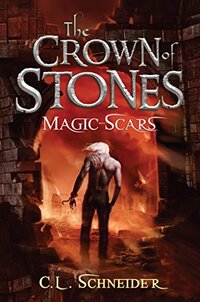C. L. Schneider Interview Published on: 24, Sep 2017
 Tell us a bit about your life growing up in Kansas. Was The Wizard of Oz a favorite growing up?
Tell us a bit about your life growing up in Kansas. Was The Wizard of Oz a favorite growing up?
A tiny Kansas town was a great place to be a kid—in some respects. I had a lot of family around. My parents had land and animals, and I spent a great deal of time outside playing pretend. I loved it. It was perfect for nurturing my imagination. As I got older, though, I yearned for more. I wanted what most teenage girls want: excitement. And shopping malls, of course! Looking back now, I appreciate the small-town atmosphere so much more than when I was sixteen. I believe The Wizard of Oz is required watching when you’re from Kansas! I adored it and, of course, watched it several times. But I watched a lot of old movies with my mother growing up. Wizard of Oz was just one of the many classics I enjoyed.
What is your favorite fantasy book and how did it impact your writing?I have a few favorite fantasy books, but the one that impacted my writing the most was The Mists of Avalon by Marion Zimmer Bradley. My brother gave me a copy when I was a senior in high school. It was the first epic fantasy I’d ever read, and I fell in love. I read it twice, back to back. It didn’t impact my writing directly, but it was because of The Mists of Avalon that I decided to focus my writing in the fantasy genre.
Do you think it is important for an author to have other author friends? What other authors are you friends with?I believe it’s extremely important to have author friends. Meeting so many wonderful fellow authors was an unexpected perk of publishing. Not only can your author friends be a network and an amazing source of inspiration and guidance, other authors are great for commiserating and celebrating. What we do isn’t easy. There are so many highs and lows in this business. It’s important to have people in your corner and in your life who know exactly how amazing, satisfying, exciting, terrifying, and frustrating it is to be a writer. It’s equally important to have someone you can trust when you need advice. Before I published, I expected other authors to be competitive. I learned very early on that it’s the exact opposite. Author friends are great allies to have in your corner. I’m happy to say that I’m friends with quite a few indie authors. I can’t listeveryone I speak to on a regular basis. A few names off the top of my head are: Tom Reinhart, Angela B. Chrysler, MLS Weech, Adam Dreece, Kylie Jude, Chess Desalls, DM Cain, Clare Meyers, Virginia Gray, JR Swiger.
What is more important: scene or character description?I’m not sure I could pick one. I think for a story to work, both need to be treated with equal importance. You need to have a balance, though, because, the importance of each can shift from scene to scene, depending on the focus at that particular time. A character’s physical description is important, but even if you describe every singledetail, a reader will still form a picture in their mind that will be different from yours. Description of their personality is incredibly important. I write character-driven stories, so without properly conveying what makes them ‘real’, they won’t become real in a reader’s mind. However, to bring a scene to life, you need to sweep your readers up in the story. You can’t do that if they can’t envision where and when the characters are.So, to me, scene and character description both need to take center stage, just not always simultaneously, or at least with a subtle blending of the two.
Who was your point of reference for your character Dahlia Nite? What do you think are the best and worst things about Dahlia?The Nite Fire series is written from the fangirl side of me. It pays homage to some of my favorite TV shows: Supernatural, The X-Files, Jessica Jones, and Lost Girl, to name a few. My inspiration for Dahlia and the series came from those type of story worlds and the characters that inhabit them. Whereas Crown of Stones definitely has an epic quality, each book in the Nite Fire Series takes place over only a couple of weeks and has more of an episodicfeel. Dahlia is a strong, resilient character. She is grounded by her ideals and the sense of duty and obligation she feels toward the human race for unknowingly harboring her when she had nowhere else to go. She wants to protect them from the creatures that slip in through the torn veil between the worlds—creatures like her and others that are far deadlier. Yet, Dahlia’s self-imposed responsibility to the humans puts her in a constant state of conflict with her upbringing and the brainwashing she was subjected to on her world. Those years of training fashioned her into a hardened, skilled assassin for the dragon-queen, Naalish. During that time, Dahlia killed without question. Her only concern was to earn the praise of the dragons and to rise in the ranks. After fleeing her world, and spending nearly a hundred years among the humans, the training and conditioning she endured, as well as her own vile deeds, haunt her. Dahlia has her own personal sense of right and wrong. Yet that line can become blurred because of her past and her fear for what the future might hold if she disregards the beliefs the dragons instilled in her. Her inner conflict makes Dahlia strong, but in certain circumstances, it can be her Achilles heel. So I suppose I see it as both the best and the worth thing about her.
If book worlds were real, which would you want to visit more? (a) Narnia (b) Hogwarts (c) The Pirates of the Caribbean world (d) Game of Thrones worldDefinitely option C. I love pirates!
When writing a book, how do you when too much is too much? Or how do you know when you have to shorten a particular scene?When a paragraph or a scene is done right, there’s tempo and rhythm to it. It flows like a song. On the flip side of that, when something needs to be cut or shortened, or even expanded on, it just feels wrong to me, like notes played out of tune. When that happens, I rewrite that section or sentence until I can feel the harmony. It sounds corny, but it’s how I work. Some of the ‘flow’ happens when I’m drafting the story. The rest comes together during revisions.And it’s such an amazing feeling when it does! It’s one of the reasons I love rewriting.
A lot of writers usually begin really writing only during their later years. What is it that grabbed a hold of you when you were still in High School that made you decide you wanted to write the Crown of Stones Trilogy?I didn’t actually start the Crown of Stones until much, much later in my life. I was an early reader, and I began writing when I was very young. I was the girl who would leave the library every week with a stack too big to see over the top. By the time I was sixteen, I had a good feel for what made a story work. I’d written short stories, plays, poetry, etc., but never a novel. I read a couple of books in a row that I couldn’t finish—and that hardly ever happened to me. I tried to always finish what I was reading. But after three books in a row that were poorly written and predictable, I decided (in my sixteen year old wisdom) that I could do better. So I outlined a plot, created my characters, and started writing my first full-length novel. It was a post-apocalyptic story entitled, A Twist of Fate. Finishing that book was an incredible accomplishment. Writing it sparked my dream of one day becoming a published author. That first book, A Twist of Fate, is currently in a box in my closet along with several other stories that I wrote in the years before The Crown of Stones. My writing style has changed so much since then, and I’ve certainly learned a lot about writing since I was sixteen! But maybe, one of these days (after a major rewrite), Twist of Fate might see the light of day.
Was it your plan to make the Crown of Stones trilogy a series from the start? Or was that something that slowly evolved as you started writing?The Crown of Stones was always meant to be a trilogy. I wanted the first book to draw readers into Ian’s life and his struggle. The second book was to put him and everything he cared about in jeopardy, to bring him down as far as I could. The third was meant to build Ian back up, slowly, turning him into the hero he was always meant to me, while uncovering all the secrets and plot twists that had been unfolding throughout the trilogy.
Are you more of an ice-cream or cake kind of person?Ice cream! But I’ll take both if you have them
How much time does it usually take you to write one book? Was there any book that was particularly easier or harder to write and why?I would say the average is 9-12 months from start to finish, including draft, revisions, developmental edits, copy edits, and proofreading. Some have taken longer, some shorter. It depends on the story and the complexity of the plot. Magic-Borne, the final book in The Crown of Stones Trilogy, was both the easiest and the hardest for me. It was easy in the fact that (after three books) I knew the characters better so well. The dialogue just about wrote itself! I didn’t have to think in the slightest when they were interacting. It just flowed out. Magic-Borne was also the hardest because there were so many threads and character arcs to tie up, while at the same time, I was delivering new twists. I spent a lot of time worrying about whether or not I was giving my readers the best conclusion I could, and the characters as well. After spending so many years with them, I wanted to do each and every character justice.
What do you think the future holds for literature and their writers?New sub-genres seem to be popping up every week, especially in fantasy fiction. I think there will continue to be an emergence of more and more sub-genres.When it comes to writing, I’ve always believed the only limit is your imagination. If you can shape dissimilar story-elements together with a well-written plot and characters that are convincing and believable,it doesn’t matter what genre you write in or what you label your writing. The majority of the world isn’t interested in stuffing people in a one-size-fits-all box anymore. Writers don’t have to be content with cozy mysteries or political thrillers—unless they want to be. There are many talented authors whose fans gobble up their books, all written within tried and true genres. The readers know the parameters of what they’re getting. They like a formulaic feel. They trust the author to deliver within their comfort zone. But, if there’s a writer out there who wants to craft an alternate history, fairytale, cyber-punk, apocalyptic story—there has never been a better time. And if your chosen sub-genre isn’t out there yet, give it a week.
Who designs your book covers? Do you think that a book cover plays an important role in sales?My covers are designed by Alan Dingman. He’s incredibly talented. I love working with him. Covers are a crucial piece of the puzzle. They are your books first impression and one of the strongest weapons in an author’s arsenal. You absolutely should never skimp on a cover. They speak for you. In one glance, they can tell a potential reader so much about your story and about you as a writer.
Lastly, how do you promote your work on social media? Has AllAuthor been helpful in this regard and would you recommend it to other authors?I enjoy connecting and promoting on social media. Twitter, especially, is kind of addicting for me, but I still don’t post every day. Authors wear so many hats. It’s a balancing act to fit everything in and still have time for your family. I’m also not a fan of the hard sell. When I’m running a Kindle saleor have an event coming up, I post more often, because I want everyone who is interested in my work to have the opportunity to take advantage of the low price or enjoy the event. Otherwise, I try not to bombard my followers with endless “buy my book” posts. I’m a firm believer in selling yourself, not your product. If I’m writing a draft, though, I definitely pull back from social media. It’s easy to get caught up and loose hours. I can’t risk the distraction. AllAuthor has been great. The auto-tweet feature is very handy. There are days when I just don’t have time to promote, and it’s nice to know I can rely on AllAuthor to do it for me. And that’s just one of many valuable services offered. I would (and have)recommend AllAuthor to my writing and reading friends.
Share C. L. Schneider's interview
We had some conversation with our one of the best fantasy author C. L. Schneider and tried to know more about her. Schneider grew up in Kansas town on the Missouri River, a Midwestern state that epitomizes the U.S. heartland with its Great Plains setting of rolling wheat fields. She grew up in a family of readers, all with diverse interests, where she developed an early and avid love for the written words. Her fascination with science fiction & supernatural stories drew her to fantasy. Her debut novel was The Crown of Stones: Magic-Price, the first book in her epic fantasy trilogy. It is a gripping account of one man's struggle to accept who and what he is. She now lives in New York's Hudson Valley with her husband and two sons and is our proud member too.

